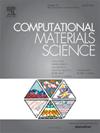A methodology for direct parameter identification for experimental results using machine learning — Real world application to the highly non-linear deformation behavior of FRP
IF 3.1
3区 材料科学
Q2 MATERIALS SCIENCE, MULTIDISCIPLINARY
引用次数: 0
Abstract
In this work, we demonstrate how Machine learning (ML) techniques can be employed to externalize the knowledge and time intensive process of material parameter identification. This is done on the example of a recent data driven material model for the non-linear shear behavior of glass fiber reinforced polypropylene (GF/PP) (Gerritzen, 2022). A convolutional neural network (CNN) based model architecture is trained to predict material modeling parameters based on the input of stress–strain-curves. The optimal model architecture and training setup are determined by hyperparameter optimization (HPO). Solely virtual data, generated using the target material model, is used throughout the training and HPO. The final CNN is capable of calculating model parameter combinations from experimental stress–strain-curves which lead to excellent agreement between experimental and associated model curve.利用机器学习直接识别实验结果参数的方法 - FRP 高度非线性变形行为的实际应用
在这项工作中,我们展示了如何利用机器学习(ML)技术将知识和时间密集型的材料参数识别过程外部化。我们以最近针对玻璃纤维增强聚丙烯(GF/PP)非线性剪切行为的数据驱动材料模型(Gerritzen,2022 年)为例进行了说明。基于卷积神经网络(CNN)的模型架构经过训练,可根据输入的应力-应变曲线预测材料建模参数。通过超参数优化(HPO)确定最佳模型架构和训练设置。在整个训练和 HPO 过程中,只使用使用目标材料模型生成的虚拟数据。最终的 CNN 能够根据实验应力-应变曲线计算出模型参数组合,从而使实验曲线与相关模型曲线达到极佳的一致性。
本文章由计算机程序翻译,如有差异,请以英文原文为准。
求助全文
约1分钟内获得全文
求助全文
来源期刊

Computational Materials Science
工程技术-材料科学:综合
CiteScore
6.50
自引率
6.10%
发文量
665
审稿时长
26 days
期刊介绍:
The goal of Computational Materials Science is to report on results that provide new or unique insights into, or significantly expand our understanding of, the properties of materials or phenomena associated with their design, synthesis, processing, characterization, and utilization. To be relevant to the journal, the results should be applied or applicable to specific material systems that are discussed within the submission.
 求助内容:
求助内容: 应助结果提醒方式:
应助结果提醒方式:


